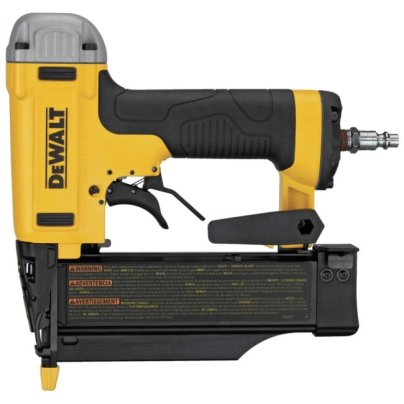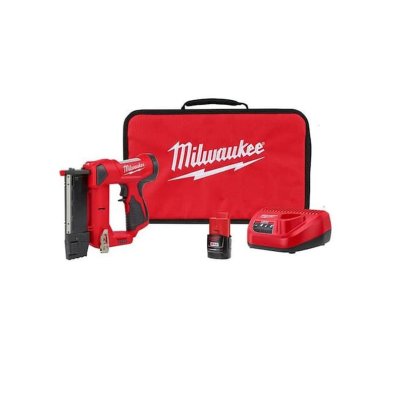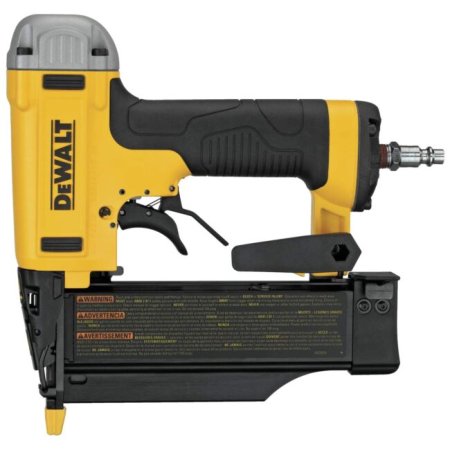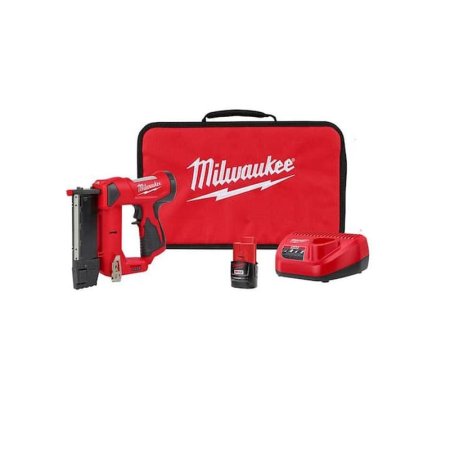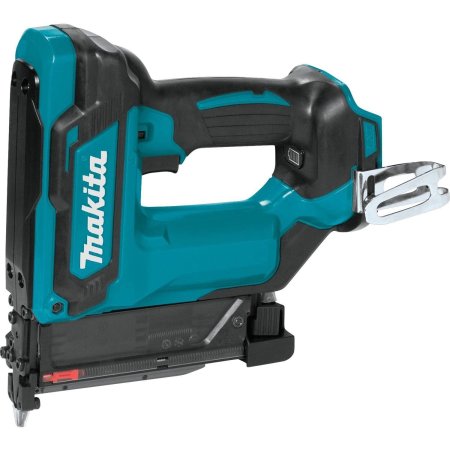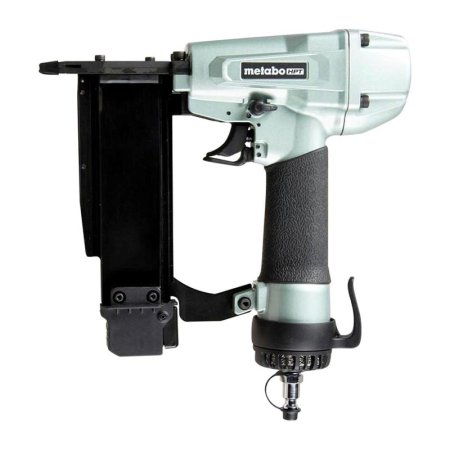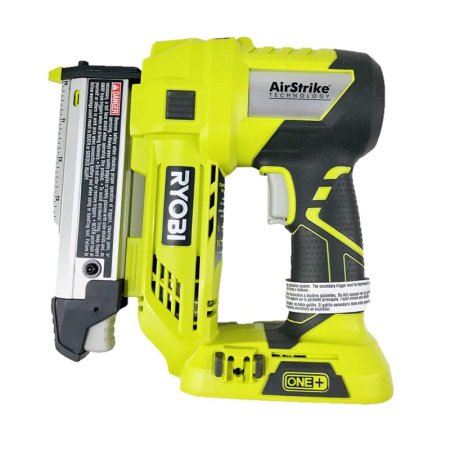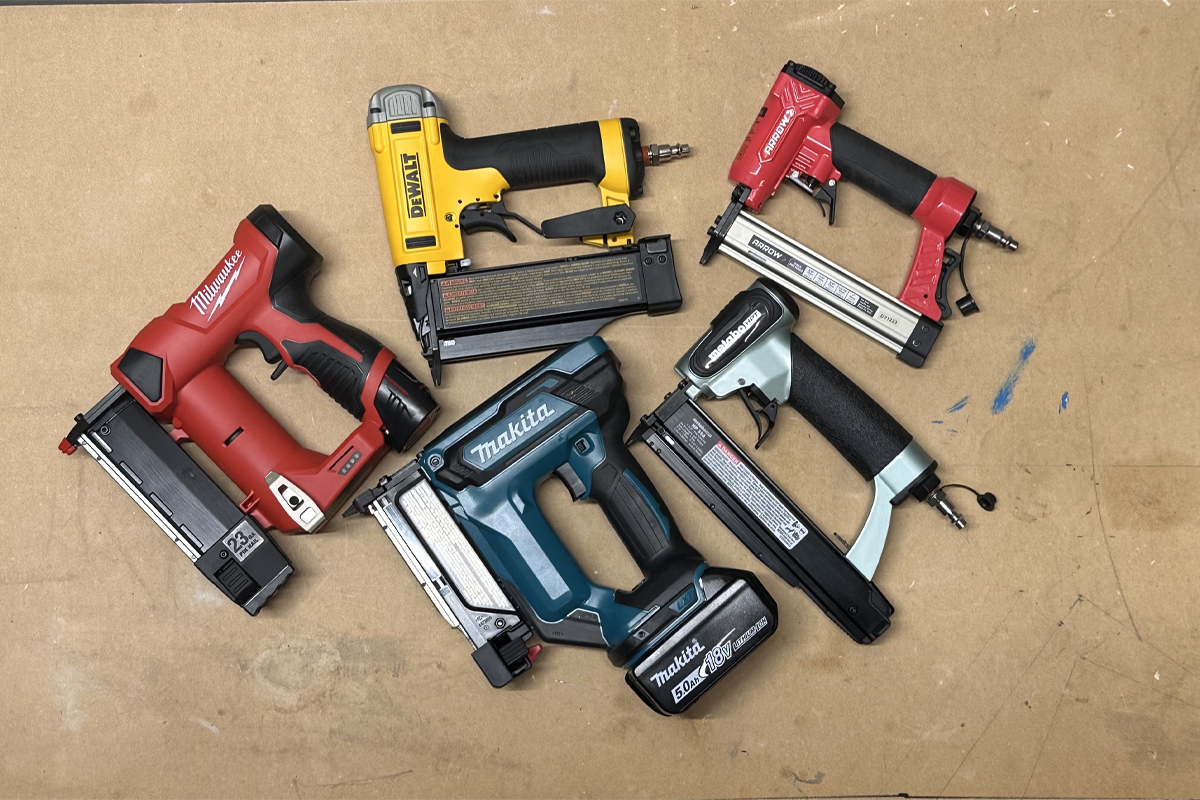
We may earn revenue from the products available on this page and participate in affiliate programs. Learn More ›
When finishing nails or brad nails are simply too large for your carpentry project, you probably need a good pin nailer to get the job done. Finish nails and brad nails often act like wedges through thinner pieces of wood, causing the piece to split or crack. And when it doesn’t crack, the force of the finish nailer or brad nailer leaves behind large holes that require going back with wood putty to fill.
But pin nailers, also known as micro-pinners, drive very thin fasteners that are actually just sturdy wires into wood to secure pieces together. The pins themselves come in stacks similar to those inserted into finish nailers or brad nailers, but they don’t have a head, meaning a pin nailer can drive one without leaving a noticeable hole. This makes pin nailers ideal for delicate trim, woodworking, and crafts.
After testing five pin nailers from some of the top tool brands in the business, our favorite was the DeWalt DWFP2350K pin nailer. We loved its superior build quality and ability to drive longer pin nails cleanly into denser wood. Ahead, learn more about our test results and discover which factors are most important to consider when choosing between the best pin nailers.
- BEST OVERALL: DeWalt DWFP2350K 23-Gauge Pin Nailer
↓ Jump to Review - BEST BANG FOR THE BUCK: Arrow PT23G Pneumatic Pin Nailer
↓ Jump to Review - UPGRADE PICK: Milwaukee 2540-21 M12 23-Gauge Pin Nailer Kit
↓ Jump to Review - BEST BATTERY: Makita XTP02Z 18V LXT Lithium-Ion Cordless Pin Nailer
↓ Jump to Review - BEST RANGE: Metabo HPT NP50A 23-Gauge Pro Pin Nailer
↓ Jump to Review - BEST FOR PROS: Bostitch BTFP2350K 23-Gauge Pin Nailer
↓ Jump to Review - ALSO CONSIDER: Ryobi P318 18V One+ AirStrike 23-Gauge Pin Nailer
↓ Jump to Review
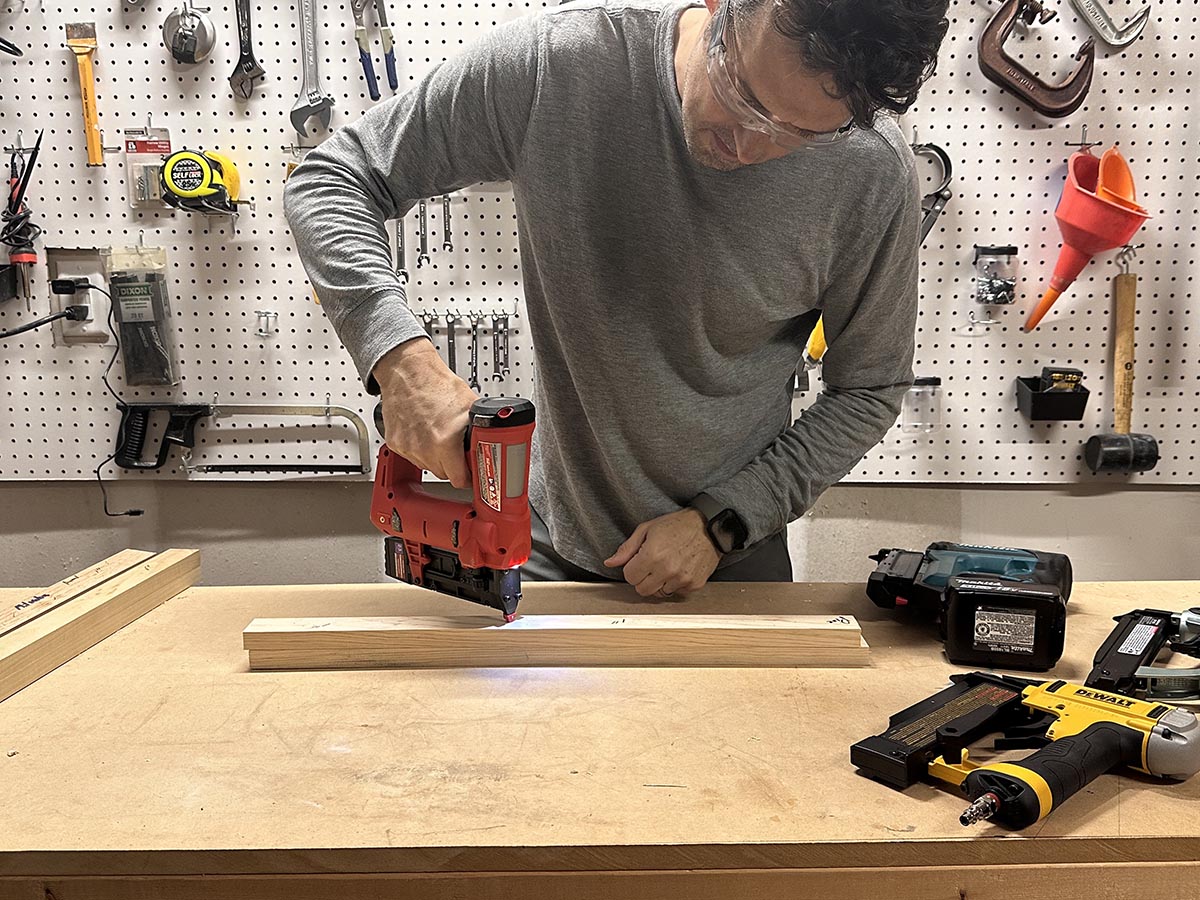
| Testing Stats | |
| Products tested | 5 |
| Time spent testing | 3 hours |
| Tests performed | 3 |
| Price range | $40 to $220 |
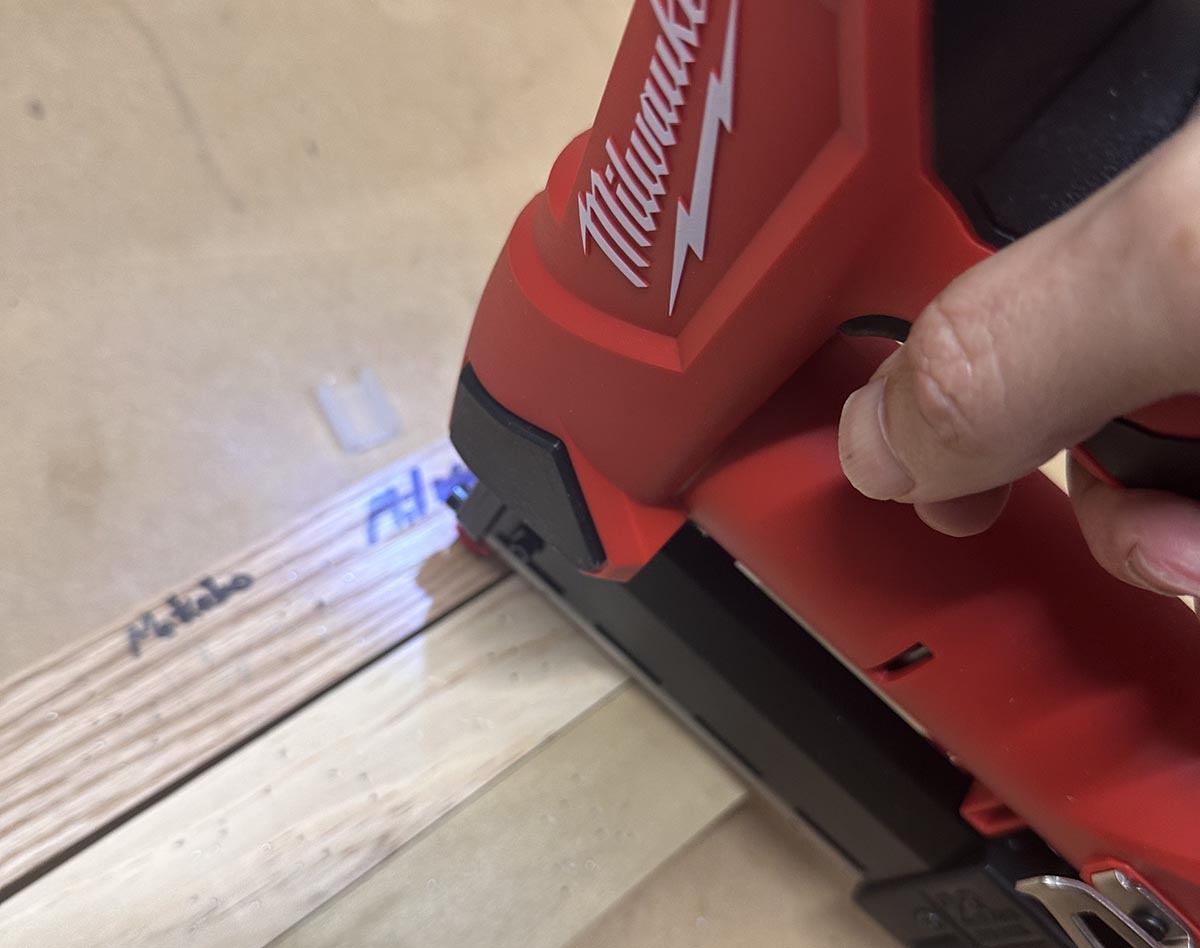
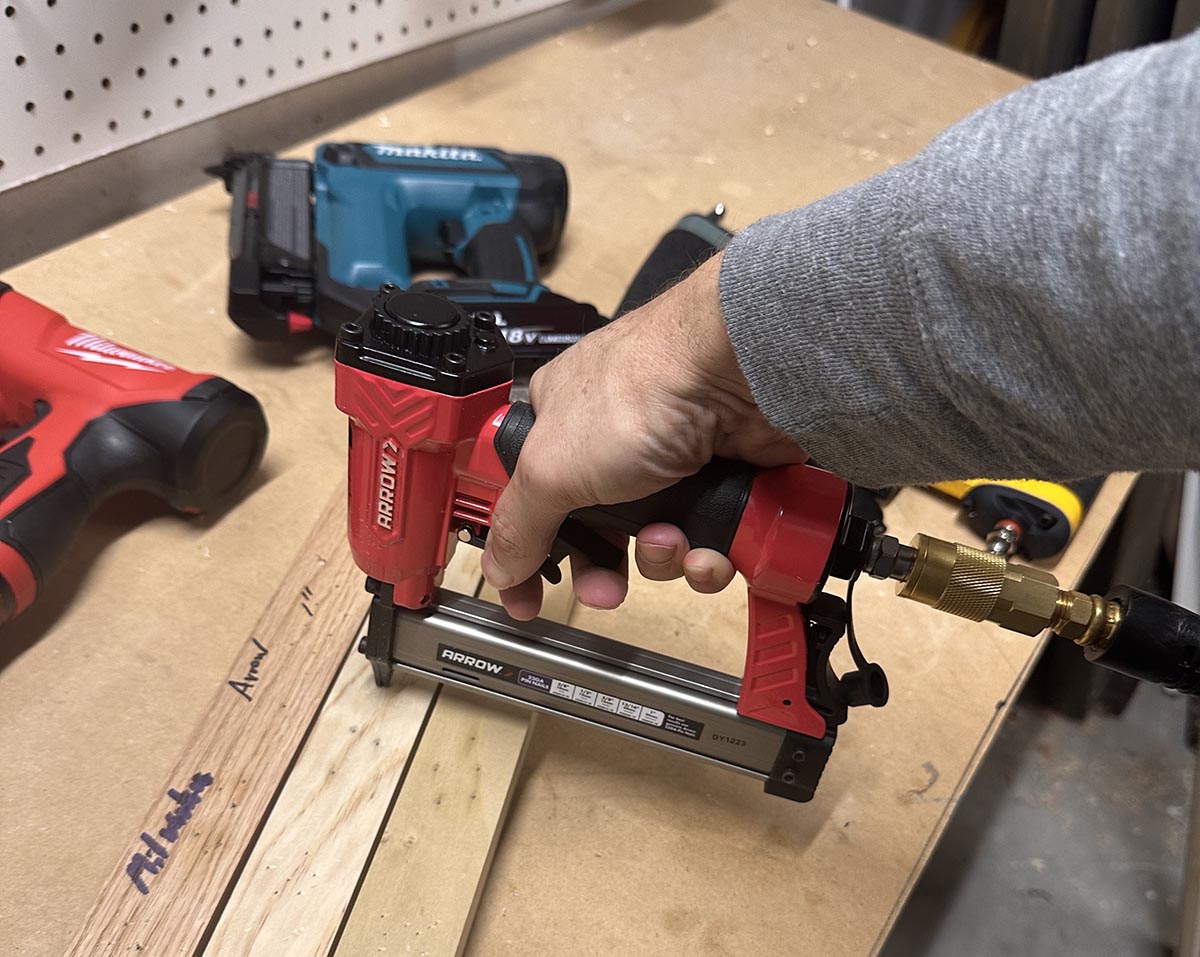

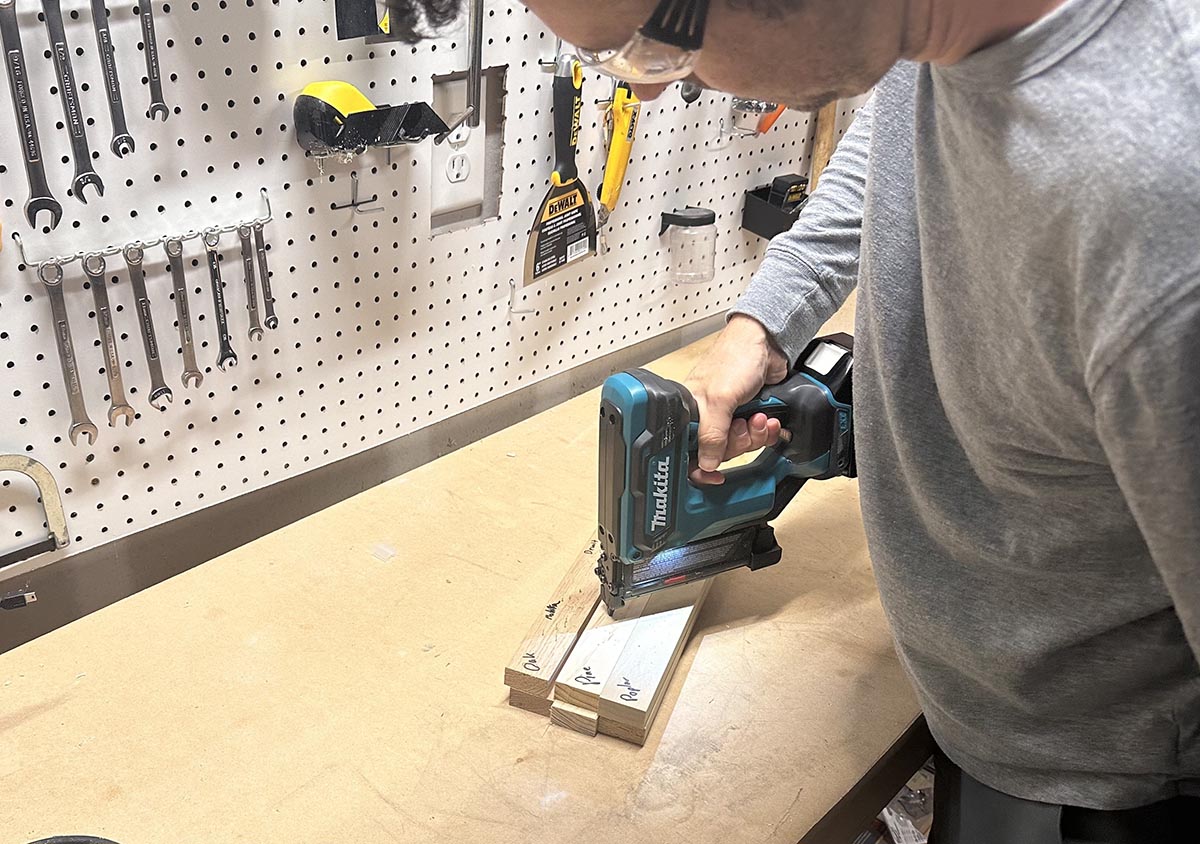
Our Top Picks
The following is a list of some of the best pin nailers on the market. Each of our top picks is organized by category and comes with a thoroughly vetted list of pros and cons to help you determine which is the ideal model for your needs.
Best Overall
DeWalt DWFP2350K 23-Gauge Pin Nailer
What We Like
- Can handle nails up to 2 inches long
- Countersinks nails reliably
- Sturdy build quality
What We Don’t Like
- A little on the bulky side
- Difficult to use depth adjuster
Product Specs
- Power source: Pneumatic
- Range: ⅝ inch to 2 inches
- Safety features: Double trigger, dry-fire lockout with bypass and reload alert, reversible belt loop
Our Ratings: Ergonomics 4/5; Ease of Use 4/5; Performance 5/5; Value 4.5/5
While DeWalt’s pin nailer is the most expensive model we tested, it’s worth splurging on if you want a pin nailer that sinks nails reliably and can handle a broad range of nail lengths.
During testing, the DeWalt’s pin-driving abilities were impressive. It reliably countersunk shorter nails and longer 1⅜-inch nails with ease. Pine, oak, poplar—it didn’t matter. Each nail we drove ended up at a near-perfect depth regardless of nail length and material type. Plus, the nailer tip produced no divots, even with the tip cover removed.
And though we didn’t load it with longer fasteners, it can handle nails up to 2 inches long. That’s far longer than any other pin nailer we found, making it capable of handling larger tasks, such as attaching baseboards.
This nailer’s impressive pin-driving power comes from having a longer cylinder than most. The flip side of that is that it has a bulkier head that’s several inches longer than other pneumatic nailers we tested, making it more difficult to fit into tighter spots.
The DeWalt pin nailer is well-built with a metal housing and ergonomic rubberized grip that’s comfortable to hold. There’s also a tool-free thumb depth adjuster accessed by releasing the jam mechanism-clearing mechanics on the nose, but I found it nearly impossible to rotate. Luckily, the tool worked so well that I didn’t need to make any depth adjustments during testing.
What our tester says: “During testing, I was impressed by the way DeWalt’s pin nailer consistently sunk even long nails into both hardwoods and softwoods, leaving only very small holes behind.”—Tony Carrick, Product Reviews tester and writer
Get the DeWalt pin nailer at Amazon or The Home Depot.
Best Bang for the Buck
Arrow PT23G Pneumatic Pin Nailer
What We Like
- Compact and lightweight size
- Half the cost of other nailers
- Durable all-metal construction
What We Don’t Like
- Struggles with longer fasteners
Product Specs
- Power source: Pneumatic
- Range: ⅜ inch to 1 inch
- Safety features: Double trigger, adjustable exhaust port
Our Ratings: Ergonomics 5/5; Ease of Use 4/5; Performance 4/5; Value 4/5
Arrow’s pneumatic nail gun won’t compete with some of the pricier ones out there, but it’s a solid budget-priced option if you only need a pin nailer for crafts, picture framing, or attaching thin, delicate trim. Since it’s limited to fasteners measuring between ⅜ inch and 1 inch, you won’t be able to use it for bigger carpentry jobs, such as installing ¾-inch-thick baseboards, hanging crown molding, or other jobs that require longer fasteners. Still, you’d be hard-pressed to find a cheaper nailer.
It also happens to be both lighter and shorter than other pneumatic pin nailers we tested, making it capable of fitting into tight spaces or working with smaller projects, such as a picture frame, with relative ease. It’s made with a durable cast-metal frame.
Performance with the Arrow nailer was a bit mixed. While it countersunk shorter ½-inch nails consistently, it had a harder time with 1-inch nails. It left nailheads on those longer nails that were either even with or slightly protruding from the wood surface on pine and poplar. On hard oak, the nailheads stood proud by about ¼ an inch. So, while we love its low price, its lack of power limits it to lighter-duty projects.
Get the Arrow pin nailer at Amazon, Ace Hardware, or Walmart.
Upgrade Pick
Milwaukee 2540-21 M12 23-Gauge Pin Nailer Kit
What We Like
- Compact size for a battery-powered nail gun
- Fires nails cleanly into dense wood
- Toolless depth adjuster is easy to operate
What We Don’t Like
- Produces slightly larger holes in softwood
- Steep price tag
Product Specs
- Power source: Rechargeable lithium-ion battery, 12V
- Range: ½ inch to 1⅜ inch
- Safety features: Double trigger, dry-fire lockout, and reversible belt clip
Our Ratings: Ergonomics 4/5; Ease of Use 4.8/5; Performance 5/5; Value 4/5
Milwaukee’s cordless power tools typically outperform other tools in their class, and this pin nailer is no exception. It’s lightweight and compact, and it performed as well as any pin nailer we tested. Since it uses the brand’s 12V battery system, users who are already invested in the system can take advantage of the batteries they already own.
Of the five pin nailers we tested, the Milwaukee was one of only two to fire longer 1⅜-inch nails cleanly into two stacked pieces of ¾-inch oak, a credit to its nitrogen-air spring mechanism. While others left nailheads standing proud above the wood surface, the Milwaukee reliably countersunk the head of each nail we fired with no exceptions. It also did a great job of driving nails into soft poplar and pine without over-sinking them. Making depth adjustments was simple thanks to an easy-to-operate thumb screw, while other pin nailers we tested required us to open the head, had adjusters that were very difficult to move, or required tools. Our only complaint with this pin nailer’s performance is that it left slightly larger holes in the wood than we hoped.
Battery-operated nail guns are usually significantly larger and heavier than pneumatic nailers because they carry their power source on their back. Milwaukee’s pin nailer is surprisingly compact thanks to the small 12V battery it uses.
While Milwaukee’s pin nailer comes at a premium price, it’s worth the investment for professional woodworkers and DIY carpenters who plan on doing a lot of pin-nailing.
What our tester says: “Milwaukee’s pin nailer managed to produce enough power to drive longer nails into dense materials without fail while still somehow staying lightweight and compact.”—Tony Carrick, Product Reviews tester and writer
Get the Milwaukee pin nailer at The Home Depot or Ace Hardware.
Best Battery
Makita XTP02Z 18V LXT Lithium-Ion Cordless Pin Nailer
What We Like
- Consistently fires nails into softwoods
- Easy-to-operate design
- Ergonomic handle and grip
What We Don’t Like
- Doesn’t fire pins into hardwoods cleanly
Product Specs
- Power source: Rechargeable lithium-ion battery, 18V
- Range: ⅝ inch to 1⅜ inches (but not 1¼ inches)
- Safety features: Nose no-mar tip, dry-fire lockout mechanism
Our Ratings: Ergonomics 4/5; Ease of Use 4/5; Performance 4.3/5; Value 4/5
While Makita’s 23-ga cordless pin nailer cuts you loose from the old hose/pancake-style air compressor, it comes at a cost to nail-driving power. The XTP02Z uses the brand’s 18V LXT lithium-ion battery system, allowing folks already invested in the brand to take advantage of their already-owned batteries. With a 5.0Ah battery, it can fire up to 5,300 pins ranging in length from ⅝ inch to 1⅜ inches in a single charge. It has a dry-fire mechanism that prevents the device from dry-firing when the magazine is empty, and it also features a safety no-mar tip that the user must depress to fire the trigger.
The Makita nailer’s performance was a mixed bag. While it reliably buried fasteners of up to 1⅜ inches long into softer pine and poplar, longer fasteners and harder materials told a different story.
Driving nails into harder oak was a no-go, leaving 1-inch nails protruding just above the wood surface and longer nails standing proud at more than ¼ inch above the wood. The Makita does have a depth adjuster, but we found that maxing it out did very little to improve its performance with oak.
Most battery-powered nailers are bulky, and the Makita pin nailer is no different. Due to its large 18V battery, it’s one of the heavier and larger nailers we tested.
Get the Makita pin nailer (tool only) at Amazon, The Home Depot, or Walmart.
Also Tested
Metabo HPT NP35A 23-Gauge Micro Pin Nailer Kit
Product Specs
- Power source: Pneumatic
- Range: ⅝ inch to 1⅜ inches
- Safety features: Dual trigger
When it comes to must-have tools—especially high-quality pneumatic fastening tools—Metabo HPT (formerly Hitachi Power Tools) is almost always at the top, which is why we had such high hopes for this model. As soon as we took it out of the box, we liked its compact size and light overall weight of just 2 pounds, which made it one of the easier pneumatic pin nailers to use. The Metabo HPT is also solidly built with a comfortable, rubberized grip and a cast-metal housing that feels like it can take a beating. Unfortunately, that’s where our positive impressions of this pin nailer ended.
The Metabo handled our shorter fasteners with ease, consistently driving the heads just below the surface of each test piece of wood. But from 1 inch and beyond, performance deteriorated significantly. It had no problem countersinking 1-inch fasteners into pine, but was inconsistent with our poplar board, leaving a few heads poking just above the surface. It struggled even more with longer fasteners, failing to drive 1⅜-inch nails fully into the pine while leaving pins standing a ¼ inch to ½ inch proud from the wood surface on our oak boards. The problems persisted even after making depth adjustments and removing the tip. Upping the pressure to 110 PSI (pounds per square inch) helped to mitigate this issue, but then the nail gun left noticeable divots in the wood. Given these shortcomings, we’d be hard-pressed to recommend this pin nailer.
More Great Options
Along with our tested pin nailers, we also recommend the following nailers based on our research and experience.
Best Range
Metabo HPT NP50A 23-Gauge Pro Pin Nailer
What We Like
- Wide pin-length range for a variety of projects
- Durable aluminum magazine is lightweight and prevents jamming
- Built-in 360-degree adjustable belt hook
- Includes case, no-mar tips, oil, and safety glasses
What We Don’t Like
- Depth adjustments are not toolless
Product Specs
- Power source: Pneumatic
- Range: ½ inch to 2 inches
- Safety features: Double trigger, dry-fire lockout, and 360-degree adjustable rear exhaust
Versatility abounds with this pin nailer from Metabo HPT. Not only does this pin nailer live up to the brand’s reputation for delivering high-end fastening tools, but it does so while offering a wide range of fastener lengths. This model accepts 23-gauge pins measuring ½ inch to 2 inches long, allowing it to tackle small crafts or heavy-duty paneling and trim.
This pin nailer kit comes with a case, no-mar tips, oil, and safety glasses. The magazine features aluminum construction, the grip has a cushioned design, and the 360-degree rear exhaust can direct any annoying air flow away from the user. The base has a built-in 360-degree adjustable belt hook and a silencer to minimize noise as well. The two included tips are narrow enough to get into tight places and are also no-mar, meaning the user won’t scratch or dent expensive woodwork while fastening. Users can adjust the depth of the fastener, but that does require a wrench.
Get the Metabo HPT NP50A pin nailer at Amazon or Lowe’s.
Best for Pros
Bostitch BTFP2350K 23-Gauge Pin Nailer
What We Like
- Wide pin-length range for light- to heavy-duty tasks
- No-mar tip and double trigger for safety
- Reversible belt hook
- Toolless depth adjustments
What We Don’t Like
- Wider magazine can be a bit bulky
Product Specs
- Power source: Pneumatic
- Range: ⅝ inch to 2 inches
- Safety features: Double trigger, dry-fire lockout with bypass alert, and reversible belt hook
Pros who need to get the job done quickly and efficiently should check out Bostitch’s 23-gauge nailer. This tool features a wide range of pin lengths between ⅝ inch and 2 inches, and it doesn’t require any tool to clear jams—all you have to do is unlatch the clasp near the nose, flip up the guard, and clear the jam. The toolless depth adjustment knob is also under that guard.
This pneumatic nailer features a no-mar tip and a double trigger, allowing users to fire safely and accurately without damaging the wood surface. It also has a dry-fire lockout with a bypass alert and a reversible belt hook for excellent portability. Like other models with larger pin ranges, the wider magazine can make this pin nailer seem a bit bulky in tighter spots.
Get the Bostitch pin nailer at Amazon, Lowe’s, Walmart, or Menards.
Also Consider
Ryobi P318 18V One+ AirStrike 23-Gauge Pin Nailer
What We Like
- Battery-powered design utilizes Ryobi AirStrike Technology
- General-purpose range of pin lengths
- Built-in belt loop and LED lights
What We Don’t Like
- Tool-only purchase
Product Specs
- Power source: Rechargeable lithium-ion battery, 18V
- Range: ½ inch to 1⅜ inches
- Safety features: Dry-fire lockout, double trigger, non-marring pads, belt clip, and LED light
Folks who have already invested in several One+ tools from Ryobi should check out the P318 AirStrike. This battery-operated pin nailer uses One+ lithium-ion batteries to fire pins between ½ and 1⅜ inches, offering a general-purpose range from a highly portable pin nailer. Plus, it is capable of firing up to 60 pins per minute.
This pin nailer has plenty of built-in features as well. It has a built-in belt clip, an LED worklight, a dry-fire lockout, and a double trigger to prevent accidents and facilitate sequential nail driving. This pin nailer also comes with a convenient GripZone overmold design for a comfortable grip while in use. Keep in mind that this is a tool-only purchase, which can be a good way to save money, but only for folks who already own the batteries.
Get the Ryobi pin nailer (tool only) at Amazon.
Jump to Our Top Picks
How We Chose and Tested the Best Pin Nailers
Choosing the top pin nailers involved research and hands-on testing. We began by reaching out to Jonathan Warshaw, founder and owner of Simple Woodworker, who boasts more than 15 years of experience in woodworking. “When I choose a pin nailer for my projects, I look for power, battery life, and adjustable depth control,” he says. “These factors ensure versatility and efficiency in various woodworking tasks.” As we deliberated over our top recommendations, we considered these key factors.
After selecting our models, we evaluated the performance of five of our picks by using each one to fire nails into different types of wood and with different-length nails. Specifically, we fired ⅝-inch and 1⅜-inch nails into test pieces of poplar, pine, and oak. We noted how well each nailer sunk nails below the wood surface, observed the size of the nail holes, and assessed whether the nailer left behind any noticeable divots in the wood.
What to Consider When Choosing a Pin Nailer
For a device that fires such a small fastener, there is a lot to know about pin nailers. The following includes some of the most important information regarding what to look for and how to choose the best pin nailer for your needs.
Pneumatic vs. Battery
There are two types of pin nailers: those powered by compressed air and those powered by batteries. They’re both more than sufficient to drive such small fasteners, but there are pros and cons to each.
Like all pneumatic tools, pneumatic micro-pinner nail guns use tanks of compressed air to fire pins into wood. These tools attach to an air compressor with a long, flexible hose. A press of the trigger releases a small burst of air to drive a pin into the workpiece. As long as there is an air compressor, an air nailer will work. However, these tools are only as portable as the compressor powering them.
Battery-operated pin nailers drive the same fasteners but use the electricity stored within the battery to compress a heavy spring. After the user pulls the trigger, the spring releases, powering the mechanism that drives the pin. These tools are ultra-portable, but when the battery dies, it can leave the project at a standstill.
Pin Length and Size
Like most fasteners, the pins that micro nailers drive come in varying lengths. They’re available in pin nail sizes ranging from ⅜ inch to 2 inches long. Pin nailers will accommodate several of these sizes, negating the need to own several pin nail guns for different fastener lengths. Some pin nailers may feature adjustable depths that allow the user to tailor how deeply the nailer drives each pin.
The pin lengths may vary, but the thickness never does. All common pin nailers fire 23-gauge pins. This thin gauge and lack of a nail head allows for large magazine capacities—as many as 200 pins in some products.
Safety
Although pin nails are very small, they can be hazardous. Because these pins lack heads, if the user makes a mistake, a pin could easily pass through the skin, so manufacturers build safety features into their pin nailers to prevent errant firing.
Some pinner nail guns may have safety devices built into their noses. The nose must be pressed down onto a surface in order for the user to pull the trigger. Others might feature double triggers that require the user to activate both triggers separately to fire.
Manufacturers build features into these micro pinners for the device’s safety as well. Dry-fire mechanisms, for example, disable the nailer’s ability to fire when it runs out of nails to prevent unnecessarily shortening the device’s lifespan.
Ergonomics and Weight
Comparing pin nailers’ weights to other nail guns, such as framing nailers or finish nailers, reveals that they’re certainly among the smallest nail guns. However, pneumatic nailers tend to be the lightest (often just 2 pounds or so). Battery-operated pin nailers can weigh two or three times as much, which may be a factor for some DIYers. Still, for folks who use their pin nailer occasionally or in a shop setting, weight doesn’t need to be the deciding factor.
Ergonomics are also key. Repetitive use of any tool can wear the user down, so features such as rubber grips, tool-free depth adjustments, and directional air exhausts can help make using a pin nailer more enjoyable over the course of a day.
Additional Features
Some additional features might make one micro-pinner more attractive than another. Certain models may come equipped with special drops known as “no-mar,” in which the nailer utilizes special polymers that prevent scratching or denting the work surface. Others may feature very narrow tips, allowing the user to poke the tip of the nailer into very tight spaces for pinpoint nail placement.
Also, it may be worth looking for a pin nailer that comes with a carrying case to protect the tool and make storing it a bit more worry-free. And be sure to check that case for a set of safety glasses, as they can be incredibly important when working with any power tools, especially pin nailers.
FAQs
Even with all that information, there could be some lingering questions nagging you. The following is a collection of the most frequently asked questions about pin nailers, along with their corresponding answers.
Absolutely. Pin nailers are far less likely to split wood or damage a work surface. The holes they create take far less time to fill, and aligning the tip of the gun is much easier than it is with finish nailers or brad nailers.
The main purpose of a pin nailer is to tack a piece of trim or molding in place while the wood glue dries. The joint doesn’t get its strength from the pins, but rather from the glue.
Pin nailers have many applications, such as nailing a return onto a window stool, fastening mitered corners, or installing small pieces of wood trim on paneling. The pins will hold these pieces together while the glue dries.
First, decide whether a cordless or pneumatic model is right for you, and choose one with a range that is wide enough to serve your purposes. Consider your budget and eliminate models that don’t fit. Weigh the remaining options based on specs, reviews, and professional testing insights like those we’ve provided above.
Battery-operated pin nailers are excellent as they provide the same amount of power and accuracy as pneumatic models but do not require a compressor, hose, or gas cartridge. Some electric models can fire up to 2,500 pins on a single battery charge while including useful features like adjustable belt loops/clips and exhaust valves.
Most pneumatic pin nailers operate between 60 and 100 PSI, but make sure to check the manufacturer’s instructions to determine the proper range.
Most pin nailers are not a good choice for installing baseboards because the nails they fire aren’t long enough. Finish nailers are typically a better choice for baseboard installation.
The main difference between these two types of nailers is in the size of the nails they use. Most finish nailers fire 15- or 16-gauge nails, while pin nailers fire thinner 23-gauge headless nails.
Meet the Tester
Tony Carrick is a freelance writer specializing in home improvement, landscaping, technology, home security, and design for such sites and publications as Popular Mechanics, Pro Tools Review, CNN Underscored, and This Old House Magazine.
Additional research provided by Tom Scalisi.
